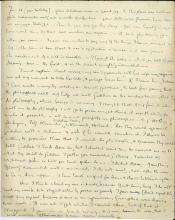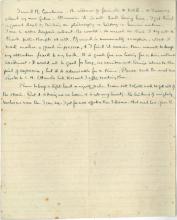BRACERS Record Detail for 18678
To access the original letter, email the Russell Archives.
"June 16 (your birthday). Your 2 letters were a great joy."
Letter 19
BR TO OTTOLINE MORRELL, 16 JUNE [1918]
BRACERS 18678. ALS. Texas
Previous Brixton letter, BRACERS 131594; next letter, BRACERS 19326
Edited by K. Blackwell, A. Bone, N. Griffin and S. Turcon
<Brixton Prison>1
June 16 [your birthday].
Your 2 letters2 were a great joy. In this place one values quite extraordinarily all marks of affection — your delicious flowers have been an immense delight. Thank you too for the soap. You can hardly imagine how each thing of that sort makes one rejoice. — It is a joy seeing you when you come. I never remember to say any of the things I have meant to say — the time is too short and one’s agitation and excitement too great. The excitement of a visit is terrible. — I loved the letter in which you told of your driving-tour3 — the first — and the second everything interested me.
I must explain about money: my brother’s quarrels with his wife4 may require me at any moment to take her side, and perhaps leave him. If I leave him, I starve. I have made money by writing on social questions,5 the last few years; but the philosophers will only help me with Geddes on the understanding that I do philosophy, which brings in no money. I thought those of my friends who wish me to do philosophy and not go to prison might think it worth while to make it possible — not so much pacifists as philosophers — e.g. Arthur Dakyns, Prof. Alexander, Wildon Carr,a Littlewood, Hollond. Then they could approach Geddes with a scheme and ask if he would sanction it. I should be willing to promise them that I would do philosophy, and of course they could tell Geddes I had done so, but I shouldn’t want them to consult me as to what they said to Geddes. I gather you consulted G. Murray. I wanted only Whitehead spoken to till you had spoken to me. I didn’t dream of anything officially connected with a university. I do not wish, even after the war, to be a don again — I have lost respect for dons and should hate being among them.
Here I think about my own interests, because of not being busy. I do not wish my work to be stopped either by prison or poverty. I gave away [don’t repeat this] most of my capital, because it was in an engineering firm6 which was doing war-work. It was all right while I could earn, but if that is stopped I am in a bad way. It is now, during the war, that I need money. Afterwards I can earn easily.
I mind the loneliness — the absence of friends and talk — and I worry about my own future — otherwise it is not bad being here. I get through a great deal of thinking on philosophy and history and human nature. I am in utter despair about the world — so much so that I try not to think public thoughts at all. My mind is unusually receptive: what I read makes a great impression, and I find it easier than usual to keep my attention fixed to my book. It is good for me living for a time without excitement. It would not be good for long, as excitement brings ideas to the point of expression; but it is admirable for a time. Please send the next two sheets to C.A. (Hawse End Keswick)7 after reading them.8
I have to keep a tight hand on myself, and when I come out I shall need to get rid of the strain. But it is doing me no harm and is not very beastly. The kindness of everybody touches me more than I can say. I get far more affection than I deserve. Much more love.
Your
B.
- 1
[document] The letter was edited from a digital scan of BR’s initialled, handwritten, single-sheet letter in the Ottoline Morrell papers, Harry Ransom Center, University of Texas at Austin.
- 2
Your 2 letters BR numbered the letters he received in prison from Ottoline. No. I was written between 28 and 30 May 1918 (BRACERS 114745), and no. II was dated 1 June (BRACERS 114746). Both were smuggled into Brixton, the first by Ottoline concealing it in a small bunch of flowers (see R. Gathorne-Hardy, ed., Ottoline at Garsington: Memoirs of Lady Ottoline Morrell, 1915–1918 [London: Faber and Faber, 1974], p. 251). But BR could only have been referring here to one of these letters, for the only other mention by Ottoline of her driving-tour with Philip is in a message that Gladys Rinder placed in her letter to BR dated 25 May 1918 (BRACERS 79611).
- 3
your driving-tour See note 8 to Letter 12.
- 4
my brother’s quarrels with his wife BR’s brother, Frank, was married to the novelist “Elizabeth”. The couple had married in 1916 and never got along. Frank was bullying, prone to tantrums, and in 1918 adulterous. Elizabeth’s biographer described Elizabeth as appeasing him (Karen Usborne, ‘Elizabeth’: the Author of Elizabeth and Her German Garden (London: Bodley Head, 1986), pp. 190–5. Elizabeth’s daughter described her mother’s demeanour as “martyrdom” (Leslie de Charms, Elizabeth of the German Garden (London: Heinemann, 1958), p. 178.
- 5
writing on social questions 1916 was the turning-point in BR’s authorial career when he realized he could earn a living from his pen. That year he gave two series of public lectures, “Principles of Social Reconstruction” in London, and “The World as It Can Be Made” in various cities outside London. There were ticket receipts, at least from the first series, and then there were books, Principles of Social Reconstruction (1916; Why Men Fight in the US in 1917) and Political Ideals (1917, US only). Several chapters from each series were published in non-academic periodicals. In addition, he published other articles in periodicals that paid him fees. (See K. Blackwell and H. Ruja, A Bibliography of Bertrand Russell [London and New York: Routledge, 1994].)
- 6
I gave away … in an engineering firm BR had transferred £3,000 of debentures in this company (Plenty & Son Ltd. of Newbury) to his friend T.S. Eliot, who was then employed as a schoolteacher in High Wycombe but still struggling financially. More crucially, BR felt obliged on pacifist grounds to decline the income generated by these securities, which Eliot eventually returned to him in 1927 (BRACERS 76480). For more detail, see Eliot’s letters to BR of 16 May and 5 October 1927 (The Letters of T.S. Eliot, Vol. 3: 1926–1927, ed. Valerie Eliot and John Haffenden [New Haven: Yale U. P., 2012]).
- 7
Hawse End Keswick Where Catherine Marshall’s parents lived in the Lake District, in the former county of Westmorland (now in Cumbria). Allen and she were travelling together as a couple as he continued in his efforts to recuperate after being released from prison on health grounds in December 1917.
- 8
next two sheets … after reading them I.e., Letter 18.
Textual Notes
- a
Wildon Carr Inserted.


